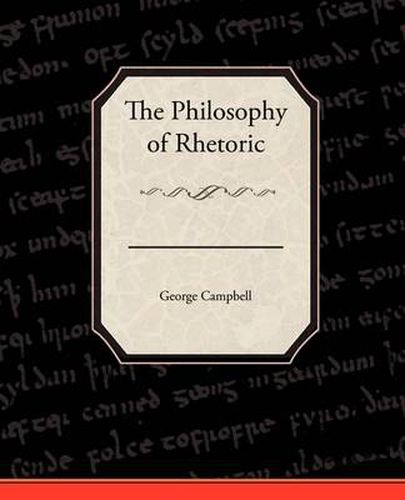Readings Newsletter
Become a Readings Member to make your shopping experience even easier.
Sign in or sign up for free!
You’re not far away from qualifying for FREE standard shipping within Australia
You’ve qualified for FREE standard shipping within Australia
The cart is loading…






This title is printed to order. This book may have been self-published. If so, we cannot guarantee the quality of the content. In the main most books will have gone through the editing process however some may not. We therefore suggest that you be aware of this before ordering this book. If in doubt check either the author or publisher’s details as we are unable to accept any returns unless they are faulty. Please contact us if you have any questions.
The Philosophy of Rhetoric is widely regarded as the most important work of a theory of rhetoric produced in the 18th century. Campbell’s work engages such themes in an attempt to formulate a universal theory of human communication. Campbell attempts to develop his theory by discovering deep principles in human nature that account for all instances and kinds of human communication. He seeks to derive all communication principles and processes empirically. In addition, all statements in discourse that have to do with matters of fact and human affairs are likewise to be empirically derived. Thus, his theory of rhetoric is vastly wider than, and different from, such classical theories as those proposed by Aristotle, Cicero, and Quintilian, whose theories focused on discourse related to civic affairs. By attempting to elaborate a general theory of rhetoric through empirical procedures, Campbell’s project reveals the limitations of his method. He cannot ground all statements empirically and it is at this point that his theological position comes into play. Inspection of his religious views shows that God’s design of human nature, and God’s revelations to humankind, make moral and spiritual truths known and quite secure to human beings, although not empirically.
$9.00 standard shipping within Australia
FREE standard shipping within Australia for orders over $100.00
Express & International shipping calculated at checkout
This title is printed to order. This book may have been self-published. If so, we cannot guarantee the quality of the content. In the main most books will have gone through the editing process however some may not. We therefore suggest that you be aware of this before ordering this book. If in doubt check either the author or publisher’s details as we are unable to accept any returns unless they are faulty. Please contact us if you have any questions.
The Philosophy of Rhetoric is widely regarded as the most important work of a theory of rhetoric produced in the 18th century. Campbell’s work engages such themes in an attempt to formulate a universal theory of human communication. Campbell attempts to develop his theory by discovering deep principles in human nature that account for all instances and kinds of human communication. He seeks to derive all communication principles and processes empirically. In addition, all statements in discourse that have to do with matters of fact and human affairs are likewise to be empirically derived. Thus, his theory of rhetoric is vastly wider than, and different from, such classical theories as those proposed by Aristotle, Cicero, and Quintilian, whose theories focused on discourse related to civic affairs. By attempting to elaborate a general theory of rhetoric through empirical procedures, Campbell’s project reveals the limitations of his method. He cannot ground all statements empirically and it is at this point that his theological position comes into play. Inspection of his religious views shows that God’s design of human nature, and God’s revelations to humankind, make moral and spiritual truths known and quite secure to human beings, although not empirically.